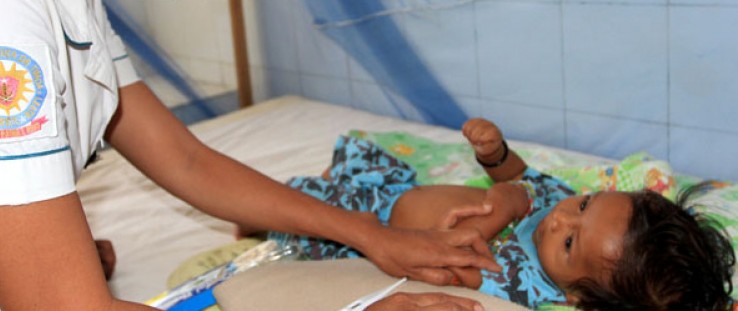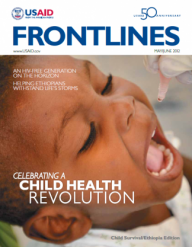 Nurse Fernanda Soares examines 5-month-old Miguel da Costa. She correctly diagnosed his pneumonia and very likely saved his life.
Maricio Borges, USAID
Nurse Fernanda Soares examines 5-month-old Miguel da Costa. She correctly diagnosed his pneumonia and very likely saved his life.
Maricio Borges, USAID
 Nurse Fernanda Soares examines 5-month-old Miguel da Costa. She correctly diagnosed his pneumonia and very likely saved his life.
Maricio Borges, USAID
Nurse Fernanda Soares examines 5-month-old Miguel da Costa. She correctly diagnosed his pneumonia and very likely saved his life.
Maricio Borges, USAID
Health Worker Article Series
Madagascar: Keeping Mothers Safe to Be Mothers
Kenya: Support from Clinic to Hospital to Home
Zambia: Coordinating Roles and Connecting with Care
Mozambique: Strength in Community Care
Bangladesh: Family Planning for Healthier Futures
Timor-Leste: Walking Together on the Long Road to Health
At the Manatuto Health Center, 40-year-old Brizida da Costa sat on a hospital bed with her 5-month-old son, Miguel. “He had a fever and was coughing,” she explains, so she decided to bring him to the clinic. She said she thought it was serious since she had recently seen a poster urging parents to bring their children to the clinic if they were sick. The diagnosis was pneumonia, one of the biggest causes of child death in Timor-Leste.
Nurse Fernanda Soares stood close by the bed. “There is a real possibility the baby would have died if Brizida had not taken her son to the clinic,” she said. Soares was able to diagnose the condition correctly and give the appropriate treatment to Miguel. Soares asked da Costa to keep her baby at the clinic for a few days and she agreed. “Parents sometimes forget to give the medicine to the baby,” explained Soares. “We wanted the baby to stay here so we could make sure he has all of his medicine.”
A major factor in Soares’s successful diagnosis was training that she received to recognize and treat many of the most common, and most dangerous, childhood illnesses. The training is part of a new supportive supervision approach being implemented through the USAID-supported Integrated Management of Childhood Illness (IMCI) program.
Last year, more than 15,000 children were treated for pneumonia by the Timor-Leste Ministry of Health using IMCI protocols supported by USAID and other partners, such as U.N. agencies.
The supportive supervision model, which was rolled out in 2009, promotes collaborative solutions through follow-up training, ongoing mentorship, and improved processes and organization. For example, an assessment showed that health facilities were struggling to maintain an adequate stock of essential medicines such as anti-malarials and antibiotics to treat childhood illness. Through the supportive supervision model, the maternal and child health coordinators and the central pharmacy of the Ministry of Health were encouraged to work together to ensure the timely requisition and distribution of medicines to all the clinical health centers and health posts. Today, as a result of improved coordination, district health clinics experience fewer stock outs of essential pharmaceuticals to treat children’s illnesses
Today, all of the ministry’s maternal and child health coordinators and relevant staff, including Soares, have received training in the supportive supervision system and help with implementing it across the country. Between 2003 and 2010, the infant mortality rate dropped from 60 to 44 per 1,000 live births, and under-5 mortality dropped from 83 to 64 per 1,000 live births, meaning Timor-Leste is on track to achieve its Millennium Development Goals in those areas.
“Timor-Leste celebrates 10 years of independence in May. This is a dramatic improvement in such a young country,” said Dr. Ruhul Amin from USAID’s Millennium Challenge Corporation Threshold Project on Immunization, and IMCI adviser.
Despite the devastation of the country’s health infrastructure in 1999 resulting from Indonesian occupation that left virtually no health workforce or infrastructure to deliver services, the country now—with USAID support—has a growing workforce of qualified health professionals, a national hospital in Dili, five referral hospitals, 67 clinical health centers, and a vibrant community program that reaches into the most remote areas of the country.









Comment
Make a general inquiry or suggest an improvement.